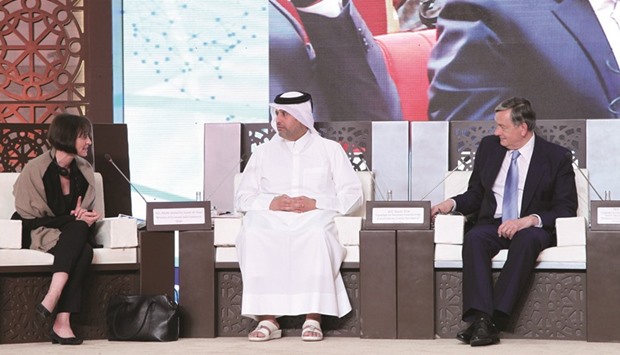Qatar and other Gulf Co-operation Council (GCC) member states have clear visions for economic transformation and sustainable development, HE the Minister of Economy and Commerce Sheikh Ahmed bin Jassim bin Mohamed al-Thani said yesterday.
Addressing the third plenary session on the global economy held as part of the Doha Forum, the minister said that Qatar had launched its Vision 2030 in order to shift away from dependence on oil and gas to a diversified economy by undertaking practical steps to reach its goal.
He called the GCC “one of the most successful economic groupings in the region”, adding that it had attained great positive results.
Outlining some of its economic achievements, he said the grouping had completed the GCC customs union and its common market was in its final phases.
“The GCC economies are complementing each other and have succeeded due to many factors,” he said, adding at the same time that there was much that could be done for more efficiency and development of this bloc at various levels.
He stressed that the leaders of the GCC countries had put forward clear visions for the development of the council in economic fields, adding: “There is a clear agenda and we’re working on as much as possible to progress within the framework of the GCC system as a strategic inescapable choice”.
He said: “I’m confident that if we compare this bloc with other groupings, we will find that it is the most successful one in the region.”
With regard to the current challenges facing the global economy, he pointed to a number of economic and geopolitical challenges, recalling the International Monetary Fund’s projection for the global economic growth at 3.2 % in 2016 and 3.5 % in 2017.
He said that the geopolitical and security problems facing countries were the biggest challenges for economic development and were restricting the flow of goods and tourists and forced the world, and the Middle East in particular, to focus on such challenges.
The Minister noted that the decline in oil prices had a significant impact on the global economy and not only on the exporting countries.
With regard to the current economic changes, he pointed out that countries of the world needed time to restructure their economies to support growth again, calling for collective action by countries and economic blocs.
The minister said that the security and geopolitical challenges facing the world pushed some states to closed-door policies and had impact on capital flows and investment.
The third plenary session, which was also addressed by various candidates for the post of secretary-general of the United Nations, discussed the nature of the challenges facing the global economy and the UN’s role in dealing with various crises and updating its mechanisms to cope with the major changes in the world.

HE the Minister of Economy and Commerce Sheikh Ahmed bin Jassim bin Mohamed al-Thani at the Doha Forum yesterday.
